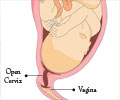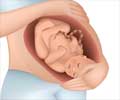Despite medical advances, myths surrounding pregnancy such as ones that state that miscarriages and defects result from circumstances beyond a woman's control, still persist reveals a study.
The study, led by Jonathan Schaffir, a clinical assistant professor of obstetrics and gynaecology at Ohio State, surveyed 200 women by circulating a questionnaire.The researcher asked respondents to rate their level of agreement with common folk beliefs about prenatal influences on foetal outcomes, and whether or not respondents had a history of an adverse pregnancy outcome.
The folkloric beliefs the participants considered included whether a pregnant woman's stress, bad mood, viewing of upsetting TV programs or attending upsetting events, excessive exercise, unfulfilled food cravings, or exposure to ugly or frightening sights could have a negative effect on her unborn baby.
The analysis found that six percent of respondents thought a mother's unfulfilled food cravings could have an adverse effect on a foetus and 5 percent believed a pregnant woman's exposure to a scary sight could hurt her unborn baby.
Thirty-eight percent of the women surveyed believed that a baby's appearance is determined at conception. More than three-fourths (76 percent) of women believed stress could cause a bad pregnancy outcome.
Also, the level of a woman's education appeared to affect her belief system, with a lower level of education resulting in a higher likelihood of blaming mothers for bad pregnancy outcomes.
Advertisement
The survey revealed that women with no history of bad pregnancy outcomes were more likely to believe a bad mood or a fright could lead to birth defects or miscarriages.
Advertisement
“The survey shows that a sizable proportion of the population believes maternal thoughts and actions contribute to adverse foetal outcomes – but despite these feelings, few assign responsibility to the mother,” Schaffir said.
“I had a call not long ago, before Halloween, from a pregnant woman asking if it would be OK to go to a haunted house. I told her it was fine,” he added.
Schaffir said that the mere existence of these beliefs suggests there is an opportunity for education in the exam room.
“I do think there is room for educating women more, particularly those who have less formal education, to prevent them from feeling any guilt in association with their pregnancy,” he said.
“Health care providers can reassure patients that these ‘old wives' tales' should not contribute to any feelings of personal responsibility.
“Most of these things are beyond anyone's control and can happen to anyone. In general, minor day-to-day experiences don't have an effect on whether a pregnancy is successful or not,” he added.
The study appears online in the journal Archives of Women's Mental Health.
Source-ANI
LIN/P











